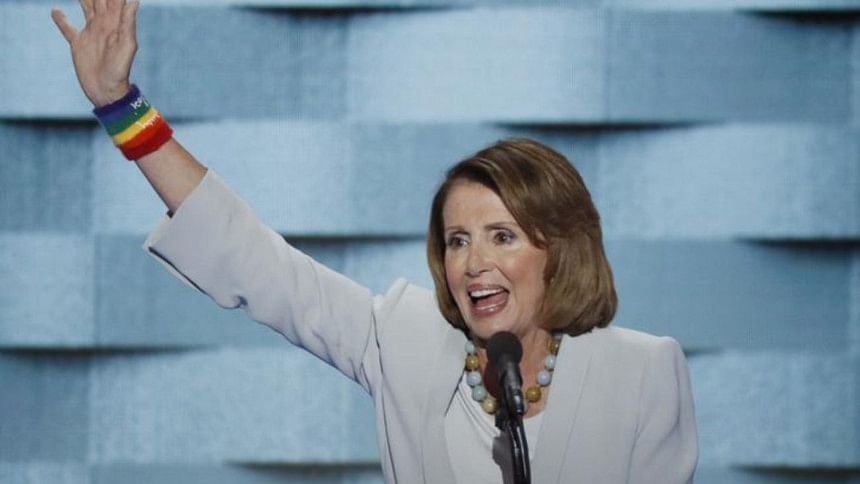Nancy Pelosi's Great Wall of Resistance

Whoever explained to then-President-elect Donald Trump what it meant to be president—if anyone did—neglected to tell him that on occasion a president loses a policy fight. That person also forgot to explain to the US president-in-waiting that making a big promise he might be unable to keep required him to figure out how to prevent his most ardent followers from turning against him when he failed to fulfil it.
Sloppy job preparation, together with Trump's distorted personality, led to the near-paralysis of much of the federal government for 35 days, the longest such period in US history, hurting around 800,000 innocent employees and ultimately humiliating a president who sets great store by being seen as strong. But, like most bullies, Trump occasionally reveals his inner weakness.
One person who spotted this is Nancy Pelosi, the Speaker of the House of Representatives. Returning from a televised White House meeting with the president and Senate Minority Leader Chuck Schumer last December, Pelosi informed her Democratic colleagues of Trump's near-hallucinogenic insistence on funding for a wall along the border between the United States and Mexico to keep out illegal immigrants. "It's like a manhood thing for him." Pelosi said, "As if manhood could ever be associated with him."
Trump had got himself into a major jam. One problem was that he hadn't expected to win the election, which meant that he could promise anything without worrying about whether he could deliver. In early January, The New York Times reported that Trump's long-time former adviser, the now-indicted Roger Stone, suggested using the idea of constructing the wall to help the professional builder remember to bring up immigration, which was to be a major issue for him, at his campaign rallies.
The trick worked too well. Trump came to rely on the wall to bring rally audiences alive. "And who will pay for the wall?" he would shout to his audience. "Mexico!" the crowds would respond in unison. Of course, Mexico had no intention of paying for such a wall.
Pelosi, as Trump has learned, is not the wimpy "San Francisco liberal" of Republican repute. Though she leans left in her political positions, she is strategically pragmatic and as tough as a situation requires. In fact, she's a product of the brass-knuckle politics of Baltimore, where her father was the boss-mayor.
Pelosi clearly flummoxes Trump. He has never had to deal with a woman as smart, dignified, and tough as she is. She is his only known political rival for whom he has not been able to devise a withering nickname (as in "crooked Hillary"): "Nancy, as I call her," he said, as he began to weaken against her, eliciting mockery in much of Washington (and on Twitter).
Trump's immaturity and abysmal judgment were on display when, in his December meeting with Pelosi and Schumer, he blurted out, "I am proud to shut down the government for border security." He added: "I will take the mantle. I will be the one to shut it down." Schumer visibly struggled not to laugh at Trump's monumental blunder. Anyone minimally well informed knows that the person recognised as causing a shutdown loses in the opinion polls. Trump had trapped himself.
Every time there's a government shutdown, Americans learn the same three things: that federal workers—derisively called "bureaucrats"—are human beings with families, illnesses, and other issues; that most don't live in the Washington area, but are spread around the country; and that government contractors get hit, too—not Boeing and the like, but building cleaners, cafeteria workers, and so forth. So, in addition to the 800,000 or so government workers—some furloughed, some required to work without pay—an estimated one million others were also directly affected. Moreover, restaurants and other small businesses in the vicinity of government facilities were hurt by a lack of business. Stories of the shutdown's harsh impact quickly began to dominate the news.
As the shutdown dragged on, politicians from both parties became increasingly restive. Republicans from areas with numerous government workers, many of them part of Trump's base, became impatient. Many Democrats worried that though Trump was getting most of the blame for the shutdown, Pelosi's intransigence would begin to backfire on them. But Pelosi held firm, counselling patience and explaining that as soon as Democrats offered Trump money for his wall, they would be playing his game and would lose their argument that the government must not be shut down because of a policy disagreement.
After government workers went without their first pay check, the politically harmful anecdotes started rolling in: a woman who would have to decide between chemotherapy and paying the rent; a guard at the Smithsonian Institution threatened with eviction; parents who couldn't explain to their children why they weren't working and had no money.
Administration billionaires, like Commerce Secretary Wilbur Ross, said lunkheaded things (such as, Why can't they get a loan?). Some employees who were forced to work without pay, in particular air traffic controllers, called in sick. FBI employees, among others, were lining up at food banks. Trump's approval ratings dropped. Airline delays became the norm. Finally, Senate Majority Leader Mitch McConnell, who above all wants to keep the Senate in Republican hands, warned Trump that their side was losing the public-relations war.
McConnell's warning, plus Republicans' expressions of anger to administration officials, turned the tide. On Friday, January 25, after five weeks of endangering thousands of travellers' lives, and making millions of innocent people miserable, Trump caved. He agreed to open the government for three weeks, with no promise of funding for the wall; it was hoped that a resolution could be found during that time. Trump had come away empty-handed.
As is his wont, Trump tried to camouflage his retreat. In a Rose Garden speech, he rambled on with familiar misleading statistics about alleged crimes committed by illegal immigrants and lied about how drugs enter the country—omitting that most come through legal ports of entry in cars, trucks, and trains rather than through openings along the southern border.
Pelosi had outmanoeuvred Trump. Suddenly, the president didn't seem so dangerous; he had tried various stratagems: a nationally broadcast speech from the Oval Office that even he knew was leaden; a visit to the southern border that even he didn't think would change any minds; threats to build his "wall"—which by now had become steel slats—by decreeing a national emergency (which would probably land in the courts), though virtually no one agreed that there was an emergency. In fact, entries into the US through the southern border are lower than they have been in years.
As it happens, on that Friday night when Trump buckled, I was at a restaurant where Pelosi and her husband, Paul, were dining with another couple. When the House Speaker left her table, customers and staff alike applauded her. A waitress standing beside me was nearly in tears. She choked out, "We need someone who will fight for us."
Elizabeth Drew is a Washington-based journalist and the author, most recently, of "Washington Journal: Reporting Watergate and Richard Nixon's Downfall."
Copyright: Project Syndicate, 2019.
www.project-syndicate.org
(Exclusive to The Daily Star)





Comments